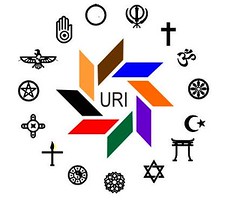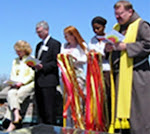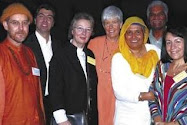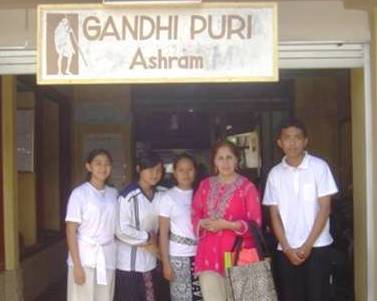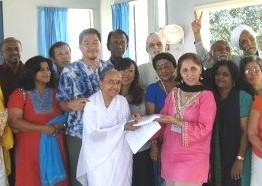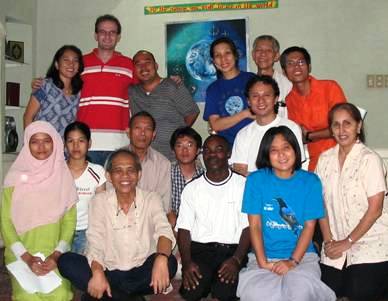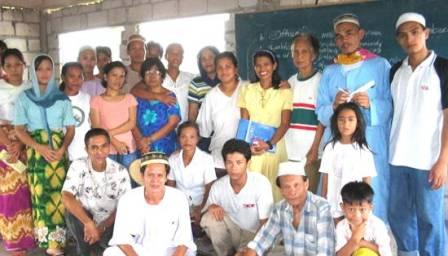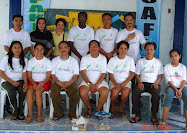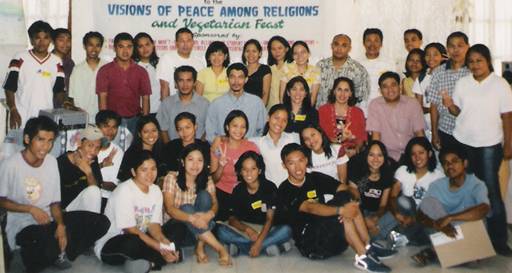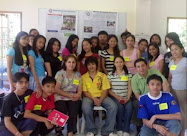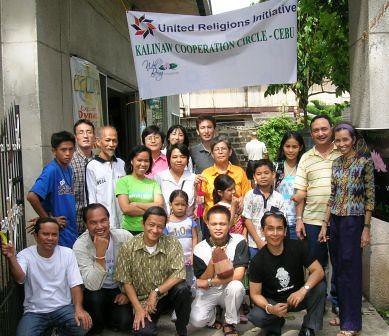URI - SEAP Global Trustee
Recently I was invited to join a group of monks on a study tour of the different cultures and religions in China. We were led by the Most Venerable Master Chin Kung, the Honorary Adviser to the Cheng Ho Multi-Culture Education Trust (CHMCET), which sponsored the trip. The aim was to promote religious harmony and world peace.
Apart from the six Buddhist monks, their assistants, and the organizing committee members, addvisers and staff, the entourage included leaders of the other major faiths in Malaysia (Islam, Christianity, Hinduism, Sikhism and Taoism). I was invited as an interfaith leader, representing the URI, Interfaith Spiritual Fellowship (INSAF), and the Malaysian Interfaith Network (MIN). There were 35 of us, from Malaysia, Singapore, Australia, and China.
The program was very tight and we went straight from the airport to the first event even before we could check-in at the hotel or rest. We visited the Diaoyutai State Guest House, which is an ornate building used as a resort palace by ancient emperors. Thereafter, we were treated to a grand reception.

In Beijing, we visited and had dialogues with the
Buddhist Association of China, the
China Taoist Association and the
Islamic Association of China. We also visited the
China State Bureau of Religious Affairs. There we were given a thorough briefing on the relationship between the government and the various religions. The Malaysian religious leaders were given ample oppotunity to ask questions and I was impressed by the openness of the bureau's director in responding to our queries. They also hosted a dinner in our honour.
China is anxious to convince the world that she is now very tolerant of all religions, provided that there is no political activism, especially any hint of independence or secession, among the adherents. This is particularly so in the light of the recent events in Tibet, and the sporadic reports of separatist movements in some of the Muslim-majority regions.
Adventure on the Silk Road
From Beijing, we flew to Urumqi, the capital of Xinjiang Uygur Autonomous Region. Urumqi was one of the main tading cities on the ancient Silk Road, and remians a very busy trading center until now. Goods and people from the former Soviet republics, Eastern Europe, Mongolia and the rest of China converge here. It is also turning into an industrial city.
Here we visited the old Shanxi Mosque, famous for its unique Chinese architecture. Another highlight was the International Grand Bazaar, which marks the commercial center of this very busy city. We were guests of a local Muslim businessman who proudly showed us his collection of old handwritten copies of the Qur'an. We also visited the Xinjiang College for Qur'an Study.
The beauty and enigma of Urumqi and Xinjiang are familiar to those who have read the classic story Journey to the West.
Xinjiang is larger than Malaysia, but has much fewer people. There are 47 "minority" ethnic groups, the largest of which are the Uygurs. The people were once Buddhists as evidenced by the ruins of Baizikeli Cheonbuldong (Thousand Buddhas Grottos) and the ancient Buddhist city of Gaochang.
Now the majority are Muslims, something not surprising seeing its close proximity to Khorasan (central Asian Muslim countries which include the former Soviet republics) and the transmigration of Muslims since the 7th century CE.
Both the Buddhist historical sites were near Turpan, another trading city on the Silk Road, about 3 hours by bus from Urumqi. The highway to Turpan traversed the arid, barren and windy Gobi Desert. It forms part of the vast Turpan Basin, which is surrounded by the snow-topped Tian Shan mountain. Here is a display of nature's bizzare contrasts.
The Way of Health
Back in Beijing on our way home, the farewell lunch was at a Buddhist-themed vegetarian restaurant. On its menu is this caption: "The True Way of Health is toboostthe body's energy in all its forms." I couldn't agree more. I have been trying to educate the public about the various forms of energy that we thrive on, and hence influence our health, and qi or life force is just one of them.
The Way of Peace

Since this was an interfaith study tour, during the long bus journeys, we took turns explaining about our respective religions to the others. When we got tired of religious talks we switched to singing and jokes. This trip was under the supervision and guidance of the Most Venerable Master Chin Kung, possibly the most successful interfaith peacemaker in this region. He is respected for his work in China, Taiwan, Malaysia, Singapore, Indonesia, Australia and many other countries. He has established the Pure Land College in Australia, and the Center of Chinese Cultural Education in Lujiang, China. Through his work, he has transformed many lives, and even entire communities. At 82 years of age, he is still working hard for religious harmony and world peace.
He is humble, soft-spoken and ever smiling. During this trip he carried his personal fold-out fan everywhere. On it is written the fundamental teachings of Islam. yet he is among the most famous Buddhist monks in the world today. i truly respect his wisdom and open-mindedness.
CHMCET was formed in honour of Admiral Cheng Ho (or Zheng He, 1371-1433), the most famous and most successful Chinese admiral, explorer, and diplomat. he led hundreds of ships in his armada to many countries in many continents. He did not conquer a single territory, but instead brought peace, trade and established diplomatic ties between these nations with China. He was already a global peace-maker in the early fifteenth century. He was a Muslim leading a non-Muslim naval force, and serving a non-Muslim Emperor.
 by Dr. Amir Farid Bin Dato Isahak
by Dr. Amir Farid Bin Dato Isahak  In Beijing, we visited and had dialogues with the Buddhist Association of China, the China Taoist Association and the Islamic Association of China. We also visited the China State Bureau of Religious Affairs. There we were given a thorough briefing on the relationship between the government and the various religions. The Malaysian religious leaders were given ample oppotunity to ask questions and I was impressed by the openness of the bureau's director in responding to our queries. They also hosted a dinner in our honour.
In Beijing, we visited and had dialogues with the Buddhist Association of China, the China Taoist Association and the Islamic Association of China. We also visited the China State Bureau of Religious Affairs. There we were given a thorough briefing on the relationship between the government and the various religions. The Malaysian religious leaders were given ample oppotunity to ask questions and I was impressed by the openness of the bureau's director in responding to our queries. They also hosted a dinner in our honour. Since this was an interfaith study tour, during the long bus journeys, we took turns explaining about our respective religions to the others. When we got tired of religious talks we switched to singing and jokes. This trip was under the supervision and guidance of the Most Venerable Master Chin Kung, possibly the most successful interfaith peacemaker in this region. He is respected for his work in China, Taiwan, Malaysia, Singapore, Indonesia, Australia and many other countries. He has established the Pure Land College in Australia, and the Center of Chinese Cultural Education in Lujiang, China. Through his work, he has transformed many lives, and even entire communities. At 82 years of age, he is still working hard for religious harmony and world peace.
Since this was an interfaith study tour, during the long bus journeys, we took turns explaining about our respective religions to the others. When we got tired of religious talks we switched to singing and jokes. This trip was under the supervision and guidance of the Most Venerable Master Chin Kung, possibly the most successful interfaith peacemaker in this region. He is respected for his work in China, Taiwan, Malaysia, Singapore, Indonesia, Australia and many other countries. He has established the Pure Land College in Australia, and the Center of Chinese Cultural Education in Lujiang, China. Through his work, he has transformed many lives, and even entire communities. At 82 years of age, he is still working hard for religious harmony and world peace.